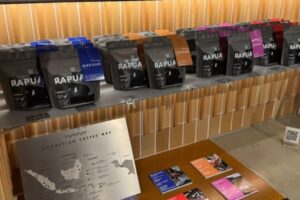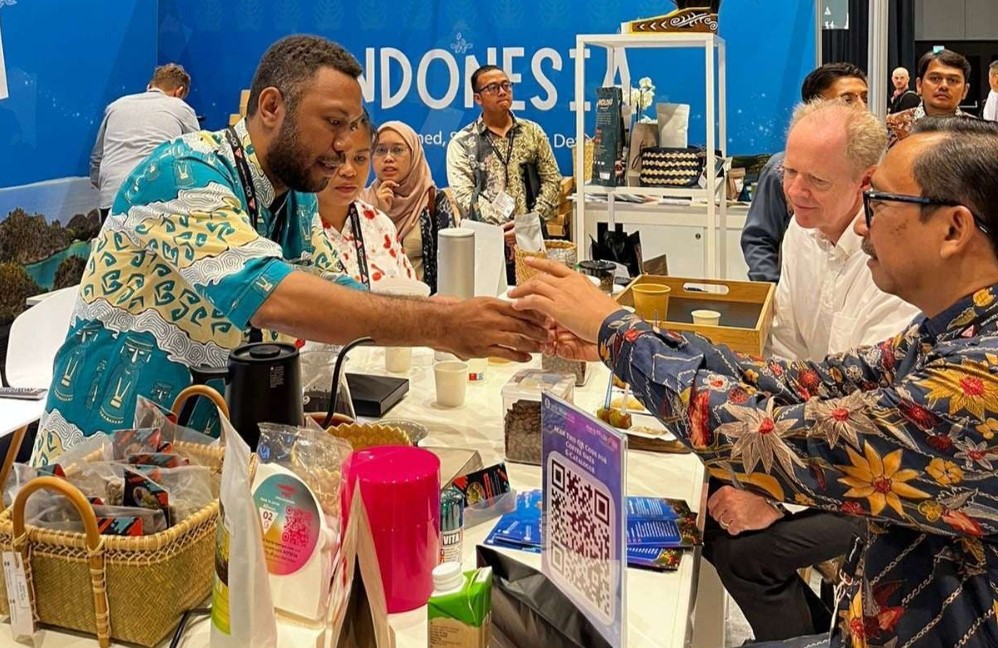
It began with the scent of freshly ground beans drifting through the bustling streets of Shibuya, one of Tokyo’s busiest and trendiest districts. But this wasn’t just any coffee—it was a distinctly Indonesian aroma, born from the misty highlands of Papua and steeped in tradition, craftsmanship, and ambition.
From August 24 to September 1, 2025, Papua Coffee Week (PCW) took over the heart of Japan’s coffee culture, presenting eight handpicked coffee varietals from Papua, Indonesia. Organized by the Bank Indonesia Papua Representative Office in collaboration with Kopi Kalyan Tokyo, the event marked a significant leap forward in Papua’s ongoing mission to claim its space in the global specialty coffee arena.
This wasn’t just a promotion—it was a statement. A cultural, economic, and strategic movement brewed over decades, now reaching its most dynamic phase.
The Journey from the Foothills of Papua to the Cafés of Tokyo
The road to Tokyo begins in the remote, fertile highlands of Papua. Nestled between rugged terrain and dense tropical forest, smallholder farmers in regions like Tangma, Peneli, Kiwirok, Maksum, Koragi, Bpiri, Homhom, and Ambaidiru tend to their coffee trees as a way of life passed down through generations.
Grown at altitudes of up to 1,700 meters above sea level, the beans produced here are naturally sweet, clean, and aromatic—characteristics that make them competitive on the global specialty market. These eight regions contributed the star products at PCW 2025: seven Arabica and one Robusta, each with unique tasting notes that reflect the microclimates and meticulous cultivation techniques of their origin.
Bringing these beans to Tokyo was the culmination of years of hard work—not just by the farmers but also by institutions like Bank Indonesia, which has long supported the transformation of Papua’s coffee sector through quality improvement, sustainable practices, and export-readiness programs.
Tokyo as a Global Gateway: Why Shibuya?
Japan is no stranger to coffee—it’s one of the largest importers of specialty coffee in Asia. And Tokyo, with its sophisticated coffee scene and discerning consumers, represents both a challenge and an opportunity. By launching Papua Coffee Week in Tokyo, organizers effectively positioned Papua’s coffee on a world-class stage, aiming not only at the Japanese market but also at global buyers, distributors, and coffee enthusiasts.
The venue—Kopi Kalyan Tokyo, a contemporary Indonesian café nestled in Shibuya—was chosen strategically. It offered not only a familiar platform for Indonesian branding but also attracted Japanese locals curious about Southeast Asia’s emerging coffee scene. Here, daily cupping sessions, manual brew demonstrations, and coffee pairing workshops introduced consumers to each of the eight Papua coffee types, allowing them to experience firsthand the diversity of flavor, body, and aroma these beans offer.
More Than Coffee: A Showcase of Digital Innovation
PCW 2025 also marked an innovative milestone in how coffee transactions are conducted across borders. In partnership with the Bank of Indonesia, the event introduced QRIS (Quick Response Code Indonesian Standard) cross-border payment capability—allowing Japanese consumers to purchase Papua coffee using Indonesia’s digital payment systems via mobile apps.
This meant more than just convenience—it was a digital bridge between two economies, simplifying trade for MSMEs (Micro, Small, and Medium Enterprises) and reducing the dependency on third-party financial services. For many of the smallholder cooperatives involved, this kind of tech-forward thinking is what will empower them to thrive beyond local markets.
A Barista Champion Tells the Story in Every Cup
Adding prestige to the event, Patrik Vinsensius, the 2023 Indonesian Barista Champion, conducted brewing demonstrations using Bpiri beans—a fan favorite among the varieties. His live sessions combined technique and narrative, illustrating how Papua’s coffee is not only delicious but also deserving of the same respect given to famous beans from Ethiopia, Colombia, or Panama.
“It’s not just about extraction,” he explained during one session. “It’s about understanding the farmer behind the bean, the altitude it grew in, and the process it went through. Papua coffee is about character—and that’s something Tokyo’s coffee lovers are beginning to deeply appreciate.”
The Bigger Picture: Global Market Expansion
PCW 2025 in Tokyo is part of a longer strategic journey. Just months prior, Papua’s coffee was showcased at World of Coffee Jakarta 2025, where it generated trade transactions worth over Rp 1.6 billion (approx. USD 100,000) through multiple Letters of Intent with buyers from Egypt, Malaysia, Bahrain, and Dubai. In 2024, at World of Coffee Copenhagen, the same coffee varieties drew interest from European importers, leading to preliminary export deals worth Rp 1.45 billion.
These international appearances are more than promotional—they represent Papua’s evolution from a domestic specialty into a globally recognized origin. This is crucial, considering how saturated the global coffee market has become. In such a competitive space, having a clear identity, consistent quality, and sustainable practices are non-negotiable—and Papua is ticking all the boxes.
Empowering the Roots: The Role of Cooperatives and MSMEs
Much of this progress is rooted in the efforts of local cooperatives like Koperasi Produsen Emas Hijau Papua, a Bank Indonesia–assisted group that focuses on building capacity, improving post-harvest handling, and connecting farmers to direct trade opportunities. These cooperatives are the backbone of Papua’s coffee expansion.
By focusing on MSME empowerment, Bank Indonesia’s strategy ensures that the benefits of global expansion are not limited to a few players but are distributed across hundreds of farmers and communities.
Each batch of exported beans not only generates income but also inspires pride and resilience within remote communities that have historically been marginalized.
The Sensory Legacy: What Makes Papua Coffee Unique
So, what is it exactly that makes Papua coffee so special?
Experts note its clean cup, floral aroma, and bright acidity—a profile more commonly associated with prized African coffees. But Papua beans add their own twist: notes of tropical fruit, brown sugar, and herbal undertones that shift based on altitude, drying method, and roast level.
Some coffee professionals compare Tangma beans to Kenyan coffees due to their complex acidity, while Ambaidiru is favored for its sweet chocolatey base—perfect for espresso blends.
This sensory diversity is precisely what gives Papua coffee its commercial edge. It’s not trying to imitate—it’s offering a new origin story.
The Road Ahead: What Comes After PCW Tokyo
While PCW 2025 marks a major achievement, the path ahead remains both challenging and full of potential. Key next steps include:
1. Securing long-term export partnerships from the LoIs initiated in Tokyo.
2. Investing in farmer training to sustain quality as demand grows.
3. Expanding QRIS and digital infrastructure across other global coffee markets.
4. Building brand narratives that highlight Papua’s culture, people, and land as inseparable from the product itself.
With continued support from stakeholders—government bodies, cooperatives, roasters, and consumers—Papua’s coffee story will likely become one of Indonesia’s most successful global agricultural tales.
Conclusion
At its core, Papua Coffee Week 2025 was not just an event—it was a revelation. It showed the world that Papua is not a hidden corner of the Indonesian archipelago but rather a cradle of flavor, resilience, and economic transformation.
From the hands of humble farmers in Wamena and Yahukimo to the sleek countertops of Tokyo’s specialty cafés, Papua coffee has crossed not just physical boundaries, but cultural and economic ones as well.
Each cup poured in Shibuya this week carried with it the story of a region on the rise—a story that is only just beginning to be told.


